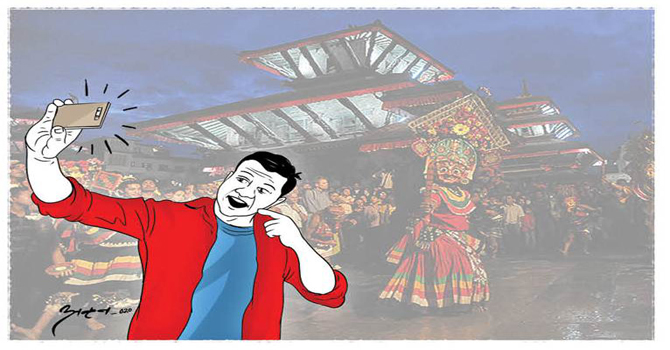Youngsters live for the moment, not in it, thanks to social media

By Aashish Mishra
Lalitpur, Mar : 5 Itilhane Samyak Mahadan concluded in the old city of Patan last week. The entire city was bustling with life during the two-day festival on February 26 and 27.
Various musical instruments were being played; the areas of Nagbahal and Mangalbazaar were decorated with colourful lights and a total of 126 statues of Dipankar Buddha were brought from all communities of Patan to be displayed to the public.
The festival, which comes once every five years, had made the city rich, vibrant and put the people in a festive mood. Yet, instead of living and partaking in the joy of the moment, youths all around were busy taking photos and videos.
Left, right and centre, everywhere the eye went, this reporter saw people in their teens and 20s putting a phone in between them and their environment. When asked, almost all of them said that they were posting or were going to post the captured photos and videos on social media.
“I want other people to see how rich our culture is,” said a girl busy taking photos of the Dipankar statues for her Instagram. “Posting on social media will help promote the festival,” said her sister, twiddling away at her own smartphone. But in roaming around and taking photos, they missed the welcoming ceremony, one of the main events of the festival, at Nagbahal.
Similarly, there were a few other people vlogging about the festival – walking around with large selfie sticks describing their activities. But in doing so, they were blocking roads for other people trying to make their way around. They were also bumping into people because they were looking at their phone and not the road. “It is not our intention to disturb anyone; we just want to capture this amazing atmosphere and show it to the world,” said one of the vloggers, who then bumped into a parked motorcycle because his sole focus was on his phone.
This story reflects the situation of other festivals in other parts of the country as well. People are displaying their culture on social media, supposedly promoting their festivals, all the while forgetting to actually participate in it.
A 2017 study published in Cyberpsychology, Social Networking, and Behaviour, called this behaviour “living for the moment rather than in it”. People wait for big events and festivals, not so they can partake in it and enjoy themselves, but rather to be able to share them on social media and show it to the world, the study said.
“This is a way to promote oneself without appearing narcissistic,” informed psychologist Rashmi Basyal.
“When you post about yourself, what you are doing and where you are going, it is seen as bragging and people may respond negatively to it,” she said, adding, “But when you post about a larger event or a cultural phenomenon then you are talking about a general issue and not directly bragging, yet at the same time, showing off how much you know and how rich your life is.”
The latter posts receive better reviews and feedback from the audience on social media and hence, younger users crave their friends’ approval for their self-image opt for it, she hypothesised.
Her assertions are also supported by the aforementioned 2017 study which reported that a majority of people respond positively to general posts that it called “general self-authored posts” rather than narcissistic ones that it called “personal self-authored”.
“However, both serve the same purpose of promoting one’s lifestyle and displaying one’s abilities and specialities, just in different manners,” it stated.
But the study presented a stark conclusion – “This trend is taking people out of the moment, quantifying people’s celebrations in terms of likes and comments and pushing people to require external validations for their enjoyment.” Basyal puts it in simple terms, “This is increasing depression.”
In the age of social media, we put a smartphone in between us and our surroundings; we create an unnecessary distance from the people around us in a quest to please those miles away and need other people to say something is fun for us to enjoy it. As a result, we are deprived of our natural happiness.
Recent News

Do not make expressions casting dout on election: EC
14 Apr, 2022
CM Bhatta says may New Year 2079 BS inspire positive thinking
14 Apr, 2022
Three new cases, 44 recoveries in 24 hours
14 Apr, 2022
689 climbers of 84 teams so far acquire permits for climbing various peaks this spring season
14 Apr, 2022
How the rising cost of living crisis is impacting Nepal
14 Apr, 2022
US military confirms an interstellar meteor collided with Earth
14 Apr, 2022
Valneva Covid vaccine approved for use in UK
14 Apr, 2022
Chair Prachanda highlights need of unity among Maoist, Communist forces
14 Apr, 2022
Ranbir Kapoor and Alia Bhatt: Bollywood toasts star couple on wedding
14 Apr, 2022
President Bhandari confers decorations (Photo Feature)
14 Apr, 2022











